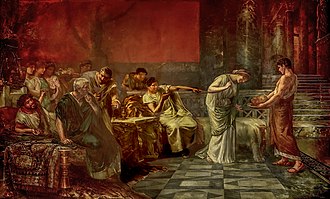Cicero





Marcus Tullius Cicero (3 January 106 BC – 7 December 43 BC) was a Roman statesman, orator, and author who served as consul in the year 63 BC. He came from a wealthy municipal family of the Roman equestrian order, and is considered one of Rome's greatest orators and prose stylists.
Early Life[edit]
Cicero was born in Arpinum, Italy, into a well-to-do equestrian family. From an early age, he was determined to pursue the path of philosophy and rhetoric, studying under some of the most noted teachers of Athens and Rhodes. This education laid the foundation for his future career as an orator and statesman.
Political Career[edit]
Cicero's political career was marked by his staunch opposition to the Populares, a political faction that sought to give more power to the Roman lower classes, often at the expense of the Senate and the traditional Roman elite. Cicero's most notable achievement came in 63 BC, when he was elected Consul and successfully thwarted the Catiline Conspiracy, a plot led by Lucius Sergius Catilina to overthrow the Roman government.
Throughout his career, Cicero was an advocate for the Republic's traditions and a fierce critic of its enemies, including Julius Caesar, Mark Antony, and Octavian. His political and philosophical writings, including the famous Philippicae against Mark Antony, have made him an enduring symbol of Roman values and republican government.
Philosophical Works[edit]
Cicero was not only a politician but also a prolific writer, whose works on philosophy, rhetoric, and law greatly influenced Western thought. His philosophical writings, such as De Republica and De Legibus, explore ideas of justice, law, and the ideal state. Cicero's works on rhetoric, including De Oratore, remain foundational texts for the study of Roman oratory.
Death[edit]
Cicero's opposition to Mark Antony after the assassination of Julius Caesar led to his inclusion in the proscriptions, a list of individuals marked for execution during the power struggles that followed Caesar's death. Cicero was captured and executed on 7 December 43 BC. His death marked the end of the Roman Republic's most vocal advocate for traditional republican government.
Legacy[edit]
Cicero's influence on the Latin language was so immense that the subsequent history of European literature has been, in many ways, a series of footnotes to his works. His writings on the republic, law, and ethics have inspired thinkers and political leaders for centuries. Cicero is also credited with introducing the Romans to the chief schools of Greek philosophy and creating a Latin philosophical vocabulary.
Ad. Transform your life with W8MD's Budget GLP-1 injections from $75


W8MD offers a medical weight loss program to lose weight in Philadelphia. Our physician-supervised medical weight loss provides:
- Weight loss injections in NYC (generic and brand names):
- Zepbound / Mounjaro, Wegovy / Ozempic, Saxenda
- Most insurances accepted or discounted self-pay rates. We will obtain insurance prior authorizations if needed.
- Generic GLP1 weight loss injections from $75 for the starting dose.
- Also offer prescription weight loss medications including Phentermine, Qsymia, Diethylpropion, Contrave etc.
NYC weight loss doctor appointmentsNYC weight loss doctor appointments
Start your NYC weight loss journey today at our NYC medical weight loss and Philadelphia medical weight loss clinics.
- Call 718-946-5500 to lose weight in NYC or for medical weight loss in Philadelphia 215-676-2334.
- Tags:NYC medical weight loss, Philadelphia lose weight Zepbound NYC, Budget GLP1 weight loss injections, Wegovy Philadelphia, Wegovy NYC, Philadelphia medical weight loss, Brookly weight loss and Wegovy NYC
|
WikiMD's Wellness Encyclopedia |
| Let Food Be Thy Medicine Medicine Thy Food - Hippocrates |
Medical Disclaimer: WikiMD is not a substitute for professional medical advice. The information on WikiMD is provided as an information resource only, may be incorrect, outdated or misleading, and is not to be used or relied on for any diagnostic or treatment purposes. Please consult your health care provider before making any healthcare decisions or for guidance about a specific medical condition. WikiMD expressly disclaims responsibility, and shall have no liability, for any damages, loss, injury, or liability whatsoever suffered as a result of your reliance on the information contained in this site. By visiting this site you agree to the foregoing terms and conditions, which may from time to time be changed or supplemented by WikiMD. If you do not agree to the foregoing terms and conditions, you should not enter or use this site. See full disclaimer.
Credits:Most images are courtesy of Wikimedia commons, and templates, categories Wikipedia, licensed under CC BY SA or similar.
Translate this page: - East Asian
中文,
日本,
한국어,
South Asian
हिन्दी,
தமிழ்,
తెలుగు,
Urdu,
ಕನ್ನಡ,
Southeast Asian
Indonesian,
Vietnamese,
Thai,
မြန်မာဘာသာ,
বাংলা
European
español,
Deutsch,
français,
Greek,
português do Brasil,
polski,
română,
русский,
Nederlands,
norsk,
svenska,
suomi,
Italian
Middle Eastern & African
عربى,
Turkish,
Persian,
Hebrew,
Afrikaans,
isiZulu,
Kiswahili,
Other
Bulgarian,
Hungarian,
Czech,
Swedish,
മലയാളം,
मराठी,
ਪੰਜਾਬੀ,
ગુજરાતી,
Portuguese,
Ukrainian
